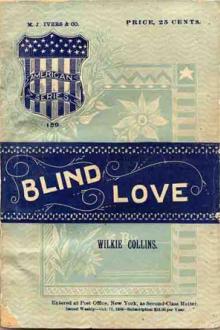Pharos, The Egyptian, Guy Boothby [best young adult book series .txt] 📗

- Author: Guy Boothby
Book online «Pharos, The Egyptian, Guy Boothby [best young adult book series .txt] 📗». Author Guy Boothby
It was not until late that evening that I saw him again, and then I was on deck. The sea was much smoother than in the morning, but the night wind blew cold. I had not left the companion-ladder very long before I was aware of a man coming slowly along the deck towards me, lurching from side to side as he walked. To my astonishment it proved to be the captain, and it was plain that something serious was the matter with him. When he came closer I found that he was talking to himself.
"What is the matter, captain?" I inquired, with a foreboding in my heart. "Are you not feeling well?"
He shook off the hand I had placed upon his arm.
"It is no good, I will not do it!" he cried fiercely. "I have done enough for you already, and you won't get me to do any more."
"Come, come," I said, "you mustn't be wandering about the deck like this! Let me help you to your cabin." So saying, I took him by the arm and was about to lead him along the deck in the direction of his own quarters, when, with a shout of rage, he turned and threw himself upon me. Then began a struggle such as I had never known in my life before. The man was undoubtedly mad, and I soon found that I had to put out all my strength to hold my own against him.
While we were still wrestling, Pharos made his appearance from below. He took in the situation at a glance, and as we swayed towards him threw himself upon the captain, twining his long, thin fingers about the other's throat and clinging to him with the tenacity of a bulldog. The result may be easily foreseen. Overmatched as he was, the wretched man fell like a log upon the deck, and I with him. The force with which his head struck the planks must have stunned him, for he lay, without moving, just where he had fallen. The light of the lamp in the companion fell full upon his face and enabled me to see a large swelling on the right side of the throat, a little below the ear.
"Another victim," said Pharos, and I could have sworn a chuckle escaped him. "You had better leave him to me. There is no hope for him. That swelling is an infallible sign. He is unconscious now; in half an hour he will be dead."
Unhappily his prophecy proved to be correct, for though we bore him to his cabin and did all that was possible, in something under the time Pharos had mentioned death had overtaken him.
Our position was even less pleasant now than before. We had only the second mate to fall back upon, and if anything happened to him I did not see how it would be possible for us to reach our destination. As it turned out, however, I need not have worried myself, for we were closer to the English coast than I imagined.
Owing to the stringency of the quarantine laws, and to the fact that the coastguards all round the British Isles were continually on the look-out for vessels attempting to land passengers, orders had been given that no lights should be shown; the skylights and portholes were accordingly covered with tarpaulins.
It wanted a quarter of an hour to midnight when Pharos came along the deck and, standing by my side, pointed away over our bow.
"The black smudge you can distinguish on the horizon is England," he said abruptly, and then was silent, in order, I suppose, that I might have time to digest the thoughts his information conjured up.
CHAPTER XVIII.
Pharos and I stood leaning against the bulwarks, gazing at the land. For my part I must confess that there was a feeling in my heart that was not unlike that of a disgraced son who enters his home by stealth after a long absence. And yet it would be impossible to tell you how my heart warmed to it. Times out of number I had thought of my return to England, and had pictured Valerie standing by my side upon the deck of the steamer, watching the land loom up, and thinking of the happiness that was to be our portion in the days to come. Now Valerie and I were certainly nearing England together; Pharos, however, was with us, and while we were in his power happiness was, to all intents and purposes, unknown to us.
"What do you propose doing when you get ashore?" I inquired of my companion, more for the sake of breaking the silence than for any desire I had for the information.
"That will very much depend upon circumstances," he replied, still without looking at me. "Our main object must be to reach London as quickly as possible." Then, changing his tone, he turned to me. "Forrester, my dear fellow," he said, almost sorrowfully, "you cannot think how I regret our little disagreement of this morning. I am afraid, while I am touchy, you are headstrong; and, in consequence, we misunderstand each other. I cannot, of course, tell what you think of me in your heart, but I venture to believe that if you knew everything, you would be the first to own that you have wronged me. Bad as I may be, I am not quite what you would make me out. If I were, do you think, knowing your antagonism as I do, I should have kept you so long with me? You have doubted me from the beginning; in fact, as you will remember, you once went so far as to accuse me of the crime of murder. You afterwards acknowledged your mistake--in handsome terms, I will own; but to counterbalance such frankness, you later on accused me of drugging you in Cairo. This was another fallacy, as you yourself will, I am sure, admit. In Prague you ran away from me, taking my ward with you, a very curious proceeding, regarded in whatever light you choose to look at it. What was your object? Why, to reach England. Well, as soon as I knew that, I again showed my desire to help you. As a proof of that, are we not now on board this ship, and is not that the coast of England over yonder?"
I admitted that it was. But I was not at all prepared to subscribe to his generous suggestion that he had only undertaken the voyage for my sake.
"That, however, is not all," he continued, still in the same tone. "As I think I told you in Prague, I am aware that you entertain a sincere affection for my ward. Many men in my position would doubtless have refused their consent to your betrothal, if for no other reason, because of your behaviour to myself. I am, however, cast in a different mould. If you will only play fair by me, you will find that I will do so to you. I like you, as I have so often said, and, though I am doubtless a little hasty in my temper, there is nothing I would not do to help you, either in your heart, your ambition, or your love. And I can assure you my help is not to be despised. If it is fame you seek, you have surely seen enough of me to know that I can give it to you. If it is domestic happiness, who can do so much for you as I?"
"I hope, Monsieur Pharos," I answered, in as dignified a manner as I could assume, "that I appreciate your very kind remarks at their proper value, and also the generous manner in which you have offered to forget and forgive such offences as I have committed against yourself. You must, however, pardon me if I fail to realise the drift of your remarks. There have been times during the last six weeks when you have uttered the most extraordinary threats against myself. Naturally, I have no desire to quarrel with you; but, remembering what has passed between us, I am compelled to show myself a little sceptical of your promises."
He glanced sharply at me, but was wise enough to say nothing. A moment later, making the excuse that he must discover where the mate intended to bring up, he left me and went forward to the bridge.
I was still thinking of my conversation with Pharos, and considering whether I had been wise in letting him see my cards, when a little hand stole into mine, and I found Valerie beside me.
"I could not remain below," she said, "when we were nearing England. I knew the effect the land would have upon you, and I wanted to be with you."
I then gave her an account of the interview I had had with Pharos, and of all he had said to me and I to him. She listened attentively enough, but I could see that she was far from being impressed.
"Do not trust him," she said. "Surely you know him well enough by this time not to do so. You may be very sure he has some reason for saying this, otherwise he would not trouble himself to speak about it."
"I shall not trust him," I replied. "You need have no fear of that. My experience of him has taught me that it is in such moments as these that he is most dangerous. When he is in one of his bad humours, one is on the alert and prepared for anything he may do or say; but when he repents and appears so anxious to be friendly, one scarcely knows how to take him. Suspicion is lulled to sleep for the moment, there is a feeling of security, and it is then the mischief is accomplished."
"We will watch him together," she continued; "but, whether he is friendly or otherwise, we will not trust him even for a moment."
So close were we by this time to the shore, and so still was the night, that we could even hear the wavelets breaking upon the beach. Then the screw of the steamer ceased to revolve, and when it was quite still Pharos and the second mate descended from the bridge and joined us.
"This has been a bad business, a very bad business," the mate was saying. "The skipper, the chief engineer, the steward, and three of the hands all dead, and no port to put into for assistance. I wish I was going ashore like you."
We shook hands with him in turn, and then descended the ladder to the boat alongside. The thought of the mate's position on board that plague-stricken vessel may possibly have accounted for the silence in which we pushed off and headed for the shore; at any rate, not a word was spoken. The sea was as calm as a mill-pond, and for the reason that the night was dark, and we were all dressed in sombre colours, while the boat chosen for the work of landing us was painted a deep black, it was scarcely likely our presence would be detected. Be that as it may, no coastguard greeted us on our arrival. Therefore, as soon as the boat was aground, we made our way into the bows, and with the assistance of the sailors reached the beach. Pharos rewarded the men, and remained standing beside the water until he had seen them safely embarked on their return journey to the steamer. Then,





Comments (0)